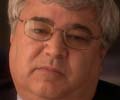- People
- Pete Rouse
- Ben Wallace-Wells
- Jeff Zeleny
- Lindsey Graham
- Related Links
- The First Time Around
Jeff Zeleny wrote a series of articles profiling Obama's first year in the Senate (see related links sidebar). Also included are interviews with Barack and Michelle Obama. (Dec. 24, 2005) - Obama in Senate: Star Power, Minor Role
A 2008 New York Times article.
Pete Rouse Chief of staff to Sen. Obama
 Read the full interview >
Read the full interview >
What was the thought early on about where he was going [in the Senate]?
Early in the first year we put together a plan that had basically three parts. The first was demonstrating that he was serious about being a senator for Illinois and delivering for Illinois. ... The legislative activities he did were primarily geared toward Illinois: the highway bill and environmental public works, ethanol for downstate Illinois and alternative energy. ...
The second was to fit into the Senate, to rise in the Senate and to show that he was a team player; that he was not a headline hunter; that he deserved better committee assignments; that he could help the leadership. ...
The third element, talking about his vision for the future, was to start to raise his profile; get people looking at him, maybe the elites and the press, as somebody who did have ideas and something different to say. And that was just seeding the ground for whatever happened in the future. ...
There's also a view out there that when he came to the Senate, he wasn't really too serious about it; that the way the Senate worked was not to his liking, not the way he operated. …
Whether or not he would be comfortable in the Senate, I think the jury was out on that. Any freshman in an organization like that -- any freshman with talent -- is going to be frustrated looking for an opportunity to move forward. You'll have an energy idea, and someone will say, "You can't do that because senator so-and-so has been doing it for 20 years." … There's a lot of that … and he might have even been frustrated more than others. …
I don't think he would have been a long-term senator. He's not on the path to being in the leadership, to stay three, four terms. But I think it was a little early to make the determination that he was not going to like the Senate. I think he just had the freshman blues. ...
One of the benefits of running when he ran is not having too long a record. [Former Sen. Tom] Daschle [D-S.D.] told him, "There's an open window here, and maybe it's not a bad thing not to have a long record." Explain your point of view on that.
I think that's right. ... He didn't have 20 years of votes to go back and people to pick up. They're doing a good job claiming he's a flip-flopper now, and he was only there for a couple of years. Imagine what you can do with a record, what they're doing to McCain on the tax cuts and so forth and so on. ... It's not the reason to run, and it doesn't mean, obviously, that you can't run with a record. But the Senate, half those votes are calculated to put people on the spot, to give them trouble running for re-election, never mind higher office. ...
Ben Wallace-Wells Rolling Stone

Obama arrives in Washington and he's already got this kind of sense of momentum and celebrity. In his personal life this is sort of a new thing for him. He's been [a] family man in Chicago for 15 years at this point. He's part-time in the [state] Senate in Springfield, but he's basically living a Hyde Park life, not famous, not anything like that. And suddenly he moved to Washington and there's been this kind of disjointed experience. He's in Washington three days a week; he's going back to Illinois every weekend. He's got the shower that doesn't work. So for him it's a sort of disruptive experience.
During this time he looks tired, a little worn. He's a guy who's very fit, but he looks like the whole experience of this is sort of getting to him. There was a story that one of his staffers told me. He goes in with Obama to the first meeting of the Foreign Relations Committee, which is Obama's big play. And [Sen.] Joe Biden [D-Del.] is chairing the meeting, and it's a [secretary of state] confirmation for Condoleezza Rice. The staff is extremely excited to be in the meeting with Obama. And it's the first big committee meeting. They got the sense that this guy's the next Bobby Kennedy. And so it's kind of a historic moment.
And midway through the meeting Biden is just going on and on. Obama, looking very serious, scribbles a little note on a piece of paper and passes it back to his aide. And the aide's very excited because this is the first communication from Obama. And the note says, "Shoot me now. Shoot, period. Me, period. Now, period."
Jeff Zeleny The New York Times

On the week before he was sworn into the United States Senate, he was the cover story and picture on Newsweek magazine. You saw the Newsweek of him next to the Time man of the year, who was George W. Bush at the time.
So here was a 43-year-old Illinois state senator. He hadn't even been sworn in, and he was on the cover of Newsweek magazine. It really rankled some of the senators who would be his colleagues. …
Did he have an apparatus around him then, a group that was looking into the future? Or was he doing it himself?
He definitely had an apparatus around him. It was mainly the people who ran his Senate campaign, some of whom are running his presidential campaign. He had a very small group of advisers who very carefully protected and crafted his brand. At the very beginning they would have meetings and things, like, what should 2005 be for Obama? They wanted more than anything else to make him look serious.
He is a serious guy, very smart. But he also was on the cover of People magazine and things. So they wanted more than anything else to make him look like a serious senator. So from the very beginning, everything was done with that in mind. …
He gets to the Senate. Are you hearing buzz that this is a guy who's got one eye cocked for the presidency?
At the time, Obama was not thinking about -- or at least talking about -- the presidential campaign. What was being discussed was, he would likely run for governor of Illinois. He would go back to Illinois all the time and have town meetings. I think he had some 30 or 40 in all parts of the state that first year. I went back with him to many of them, and he would take questions from voters. In hindsight, it sort of looks like what his presidential campaign became, his town meetings. But at the time, he was simply trying to show people that he was the senator from Illinois. …
And presumably trying to keep his head down so that the rock star status didn't incite other Democrats. ...
Obama, in the first year of his time in the Senate, he declined all invitations to appear on Sunday morning shows from January through September. The only time he agreed to go on was after Hurricane Katrina had struck New Orleans. He said he just thought he had to go on and speak at that point. But he declined Meet the Press, Face the Nation, This Week, etc., specifically to keep his head down. …
[The Senate is] a seniority system. He was the last person to ask a question on every committee hearing. So he would have to sit there for at least two hours before he could be heard. There was no question that he was very much a freshman, no question at all. So even though people knew his name and other Democrats were not household names, he was very much at the bottom of the rung.
Somebody who had [potentially] the same kind of problem is Hillary Clinton. How were Hillary and Obama about each other?
At the time, Clinton and Obama were very friendly to one another. She had flown to Chicago a couple times to help raise money for him in his Senate race. And he would tell one story of how he was so impressed and gratified at how helpful she had been. She had been testifying on the Hill in the summer of '04. There was a big thunderstorm and her plane was supposed to take off for Chicago. She was held up a couple hours. She was flying to do a fund-raiser for him. He was on the phone with her, as he would recount later, and said, "Hey, you don't have to come." And she's, "No, I'm going to come."
He felt that he sort of was indebted to her in some ways. They would have private meetings at the beginning. And he was going to sort of follow her plan for what she did in the Senate, in terms of working hard and keeping her head down. But he said one thing to me, I think in January, February '05. He said, "But I don't come here to the Senate with all the baggage that she came [with] as a former first lady." So he was at that moment drawing a big distinction with how he was arriving versus how she was arriving. …
There are famous moments with McCain. Tell me about that.
McCain and Obama had an unusual episode of friction. I don't think they really knew one another up until this point. They were both going to be on legislation for campaign finance reform. … [Sen.] Harry Reid [D-Nev.] had made [Obama] the [Democratic] point person, because he was viewed as this clean, upcoming upstart, if you will, who didn't have the baggage from being in Washington for a long time. … And one afternoon in the middle of the summer, Obama had written a letter to McCain.
Editor's Note: Read the exchange of letters between Obama and McCain.
McCain has always had the role of ethics reform and campaign finance reform. So there was a bit of tension from the start. Obama got crossways with Sen. McCain when he came to a meeting and he said, "You know what? We're not going to do this bipartisan effort. We're just going to push the Democratic bill through." It incensed McCain. He sent a letter to the press. And then he sent it to Obama. It's how Washington works. If you want to communicate something, you write a letter, but you release it to everyone first.
And McCain called him disingenuous. … It was an internal Senate thing, which was not that big of a deal outside the Beltway. But inside Washington, it was really a precursor for things to come. It was a three- or four-day back and forth with McCain and Obama sort of taking the mantle of who was the bigger reformer. …
So at the end of that week they sort of playfully mugged for the cameras. But it showed one thing: McCain was a little aggravated by this young man, Obama. …
How was Obama through this process? …
He was very deferential to his elders in the Senate throughout. But he did not back down from this. I think it was one of the early examples of him showing people that he had a spine, had his own way to approach things, and he would stick to his guns. …
Lindsey Graham Senator (R-S.C.)
 Read the full interview >
Read the full interview >
Let's talk a little bit about Barack Obama, your earliest impressions of him.
I haven't interacted with him that much. … I can only tell you about my experience with him and it was on immigration.
Now let me tell you, that's tough politics. … The immigration comprehensive bill was a big moment a couple years ago. That's where [Sen.] Ted Kennedy [D-Mass.], myself, [Sen.] Jon Kyl [R-Ariz.], and [Sen.] Ken Salazar [D-Colo.], along with Secretary [of Commerce Carlos] Gutierrez and [Secretary of Homeland Security Michael] Chertoff sit in a room for about three months going over every line of a bill. It was a bill where the senators actually get involved. We probably had 30, 40 senators coming in and out of those meetings.
Sen. Obama was one of those senators. He'd come in at times and make a contribution. He's not a regular participant, but he shows up at the end and he's got three things he wants or two things he wants. Kyl didn't want to give it to him; I did … because I know he's somebody that people pay attention to. We needed every vote we could get and we needed all the people we could to push this ball. The left hated the bill because of the labor unions. Labor unions hated the temporary worker program. … The right didn't like the path to citizenship, the ability of allowing people to come out of the shadows and have a legal status. …
So we get on the floor. You get some people doing the union bidding, trying to undo the temporary worker program. They reduce the numbers in half, but we could live with it, fix it in conference. Obama started voting in a way to undercut the temporary worker program. I went to him at least once and said: "We can't do this. This will destroy the deal." …
Finally it all blew up. Not only had he started voting the wrong way to undo the deal, he offered an amendment himself that would have sunsetted the temporary worker program after five years. What do you go tell the people on your side, the businesspeople who need access to labor? "Your program goes away after five years." …
That just made me very, very mad. … I thought instead of sticking to the deal, he gave in to pressure from the left, and the pressure from the left and right was enormous. So that did not sit well with me.
Did you talk to him about it?
I didn't talk to him until I got up and spoke against his amendment. I maybe went a little overboard, but it was a genuine reaction. I thought that Obama undercut the deal that he wanted to be part of… [and] did not live up to the spirit of what we were trying to do. And that's my experience with him. …
Inexperience? Naiveté?
That's probably the first time in a genuine way that he's ever had pushback from those that have been his support network, and that he's relied upon, and that he knows he needs to go to the next level. I have been there. It's scary. The first time my name was mentioned on Rush Limbaugh in a negative way, my office freaked out. … I think it was an overwhelming experience for him.